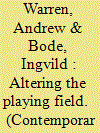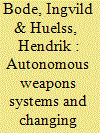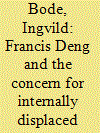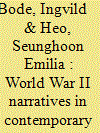|
|
|
Sort Order |
|
|
|
Items / Page
|
|
|
|
|
|
|
| Srl | Item |
| 1 |
ID:
140335


|
|
|
|
|
| Summary/Abstract |
This article will interrogate the degree to which the Obama administration has continued, even at times inadvertently, the Bush administration's challenge on international law. Notwithstanding the Obama administration's bold pronouncements pertaining to reversing its predecessor's policies, little has actually changed when it comes to how the USA considers using military force. As a means to unpack this transition, this article will firstly consider the apparent continuum of use-of-force policies from the Bush to the Obama administration, specifically: the American conflation in the line between pre-emptive and preventive self-defence options; the sustained post-September 11 legacies that continue to lower thresholds towards using military force; and how this ultimately contributes to the erosion of international law in this area. Secondly, this article presents a critical contextualization of Obama's drone programme and its legal arguments in relation to his administration's overall use-of-force policy, focusing on jus ad bellum standards. In light of the centrality of targeted killings under Obama, our article will pay particular attention to the contradiction this poses with regard to his reluctance to use military force in relation to ongoing conflicts in Libya and Syria, while also looking at recent adjustments pertaining to use-of-force pronouncements against the Islamic State (IS). The article lastly considers what this will mean for international use-of-force thresholds and the future of the general prohibition on the use-of-force in the context of new and emerging technologies and theaters should the USA continue to skew and adjust its use-of-force policies on when, how, against who and where to use such force.
|
|
|
|
|
|
|
|
|
|
|
|
|
|
|
|
| 2 |
ID:
160117


|
|
|
|
|
| Summary/Abstract |
Autonomous weapons systems (AWS) are emerging as key technologies of future warfare. So far, academic debate concentrates on the legal-ethical implications of AWS but these do not capture how AWS may shape norms through defining diverging standards of appropriateness in practice. In discussing AWS, the article formulates two critiques on constructivist models of norm emergence: first, constructivist approaches privilege the deliberative over the practical emergence of norms; and second, they overemphasise fundamental norms rather than also accounting for procedural norms, which we introduce in this article. Elaborating on these critiques allows us to respond to a significant gap in research: we examine how standards of procedural appropriateness emerging in the development and usage of AWS often contradict fundamental norms and public legitimacy expectations. Normative content may therefore be shaped procedurally, challenging conventional understandings of how norms are constructed and considered as relevant in International Relations. In this, we outline the contours of a research programme on the relationship of norms and AWS, arguing that AWS can have fundamental normative consequences by setting novel standards of appropriate action in international security policy.
|
|
|
|
|
|
|
|
|
|
|
|
|
|
|
|
| 3 |
ID:
130706


|
|
|
|
|
| Publication |
2014.
|
| Summary/Abstract |
Using the case of Francis Deng as representative of the Secretary-General for internally displaced persons as an example, this article considers how temporary civil servants may become intellectual leaders within the United Nations. During his 1992-2004 tenure, Deng managed to raise assistance and protection expectations for the internally displaced through framing their concerns in the concept of sovereignty as responsibility. He also contributed to legal change through formulating protection and assistance standards-the Guiding Principles on Internal Displacement. The article argues that a combination of three factors enabled him to exercise intellectual leadership. First, his insider-outsider position at the border between the UN Secretariat (the second UN) and the nongovernmental organizations, academic scholars, and independent experts who engage regularly with the UN (the third UN); second, his personal qualities; and third, his effective ways of framing at an opportune moment in time.
|
|
|
|
|
|
|
|
|
|
|
|
|
|
|
|
| 4 |
ID:
155290


|
|
|
|
|
| Summary/Abstract |
This article explores narratives that university students in Germany and Japan tell about World War II. Studying these narratives offers insights into how conflict, reality, and knowledge are socially constructed. Scholars in reconciliation and memory studies have mainly focused on the differences between how Germany and Japan choose to remember their wartime pasts in history curricula and textbooks. However, little is known about how far these official versions of history are reproduced or challenged by university students. Working with data collected through an online survey, our findings address this question by making two arguments: first, the depth of World War II knowledge and the variety of knowledge sources students were exposed to affect whether students engage in a reflective or non-reflective characterization of their home countries’ role. This appears to be primarily influenced by the national knowledge environment students find themselves in. Second, while students surveyed tended to reproduce official narratives, both Japanese and German students also displayed critical engagement with World War II history teaching and knowledge in their countries.
|
|
|
|
|
|
|
|
|
|
|
|
|
|
|
|
|
|
|
|
|